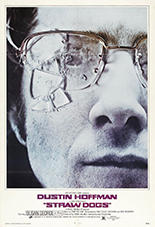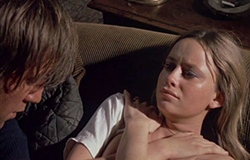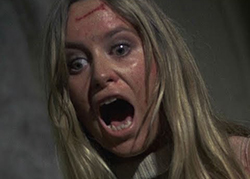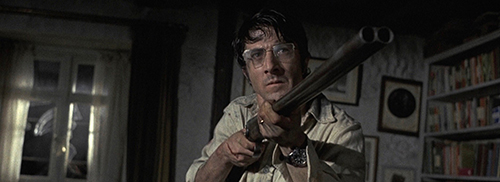
 Only a few years after the demise of Hollywood’s production code, 1971 must have prompted some serious handwringing from pundits eager to bemoan the end of civilization. Movies were seemingly awash in blood-spattered permissiveness. Dirty Harry and The French Connection showed cops whose ruthless brutality occasionally resembled that of the criminals they chased, while A Clockwork Orange and The Devils initially received X ratings for their sexual violence.
Only a few years after the demise of Hollywood’s production code, 1971 must have prompted some serious handwringing from pundits eager to bemoan the end of civilization. Movies were seemingly awash in blood-spattered permissiveness. Dirty Harry and The French Connection showed cops whose ruthless brutality occasionally resembled that of the criminals they chased, while A Clockwork Orange and The Devils initially received X ratings for their sexual violence.
And right in the middle of it all was Straw Dogs.
Even five decades after its theatrical release, Sam Peckinpah’s tale of rape and murder in the British moorlands remains the filmmaker’s most controversial work, what New Yorker movie critic Pauline Kael derisively dubbed “the first American film that is a fascist work of art.”
While the characters’ motives and politics are far too problematic for tidy condemnation, one thing is clear: Straw Dogs is a masterful thriller as complicated as it is viscerally exciting.
Dustin Hoffman and Susan George portray David and Amy Sumner. The young couple have moved to a stone farmhouse in Amy’s native Cornwall in the UK, where David, an American astral mathematician, has a grant to study stellar structures. In other words, David is an intellectual, and a socially awkward one at that, which doesn’t exactly endear him to the noncerebral, beer-swilling louts who frequent the neighborhood pub.
It doesn’t help that half the men in the village appear to be lusting after David’s blonde, beautiful wife. In fact, Peckinpah’s camera introduces us to Amy with a shot squarely of her chest, sans bra and in a tight sweater, as she strolls along a street. Among those who take notice of Amy’s return to town is Charlie Venner (Del Henney), her old flame. David, unaware of their history, hires Charlie to join a few other workmen building a garage for the Sumners.
 Aside from Charlie, the work crew includes brutish Norman Scutt (Ken Hutchison), who proudly shows Charlie a pair of undies he has stolen from the Sumner home; as well as a maniacally giggling rat-catcher named Cawsey (Jim Norton). While the men leer at Amy and scoff at David, the Sumners are busy navigating a marriage on the rocks. He is selfish and irritable; she is sullen and immature; both share a talent for passive-aggressiveness. Tensions rise. And then the cat goes missing …
Aside from Charlie, the work crew includes brutish Norman Scutt (Ken Hutchison), who proudly shows Charlie a pair of undies he has stolen from the Sumner home; as well as a maniacally giggling rat-catcher named Cawsey (Jim Norton). While the men leer at Amy and scoff at David, the Sumners are busy navigating a marriage on the rocks. He is selfish and irritable; she is sullen and immature; both share a talent for passive-aggressiveness. Tensions rise. And then the cat goes missing …
Adapted by Peckinpah and David Zelag Goodman (Logan’s Run) from a Gordon Williams potboiler called The Siege of Trencher’s Farm, Straw Dogs exudes unease in its opening minutes and doesn’t let up through the inevitably explosive conclusion. Peckinpah choreographs the violence expertly, employing a dazzling array of quick edits, slow-motion and other techniques that had catapulted him to superstardom with 1969’s The Wild Bunch. He takes his time getting to the bloodshed, too, teasing out how the marital slights and sniping begin to pile up. Hoffman and George are both magnificent in their challenging roles.
What makes Straw Dogs such a troubling watch – even after 51 years – is its graphic depiction of Amy’s rape by Charlie, and then Norman. Amy initially fights off her attacker, who slugs her, drags her across the floor by her hair, and rips open her shirt. But then Amy caresses Charlie’s face, and she responds sexually. The pair even engage in some post-coital cuddling before Norman, brandishing a shotgun, takes over for a decidedly unambiguous attack.
 The scene, which earned the movie an X rating from British censors, also proved to be an offscreen ordeal for George. The shoot took three days, during which Peckinpah reportedly refused to utter a word to the then-20-year-old actress.
The scene, which earned the movie an X rating from British censors, also proved to be an offscreen ordeal for George. The shoot took three days, during which Peckinpah reportedly refused to utter a word to the then-20-year-old actress.
Does Straw Dogs foster the toxic male myth that women secretly want to be raped? Many critics at the time certainly thought so, and still do. Peckinpah also has his defenders, who point to the twisted dynamics between the characters. They note that Charlie is Amy’s ex-lover and that her marriage is dissolving. And there is always the possibility, as some have suggested, that Amy only surrenders when it is clear Charlie has overpowered her.
Maybe so, but I am skeptical, especially given Peckinpah’s hard-to-miss misogyny in The Wild Bunch and The Getaway. Still, it is a testament to Straw Dogs’ brilliant ambivalence that even a brutal rape is open for interpretation. —Phil Bacharach

